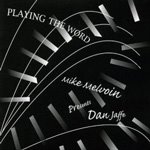
Playing the Word
Mike Melvoin Presents Dan Jaffe
City Lights
Poetic interest in music is understandable. After all, poetry has identifiably musical elements, particularly its use of rhythm. As the Beats starting improvising with their poetry, they would logically be drawn to improvisational music, namely jazz. However, many resulting collaborations between poets and jazz artists have been uneven, with the music usually relegated to providing whimsical accents to poet’s recitation. Mike Melvoin and Dan Jaffe’s Playing the Word is more successful because both artists’ voices are prominently featured.
Unlike some jazz and poetry sessions where the poet or reciting artist bellows over a blaring ensemble, Playing the Word is a simple, stripped down session—just voice and piano. Structurally, it resembles an intimate torch song performance, in which Melvoin takes legitimate jazz solos, in between the vocal passages, and Dan Jaffe’s reciting has a restrained speak-on-the-beat quality that often approximates that of a jazz vocalist. They mesh together quite well, as can be strikingly heard in their interplay on the Latin flavored “Cajon/GoJazz,” one of the CD’s highlights.
Jaffe’s poetry speaks of jazz directly, often cueing Melvoin as in “It Sure is Risky and Afterwards” when around the 5:50 mark the melody of Ellington’s “Satin Doll” dovetails into Jaffe’s passage:
With women it’s called waiting
First you wait to see if she was listening
When you played “Satin Doll”
Then to say if she meant that smile for you.
While many jazz greats are celebrated, first among equals is Charlie Parker, whose life and music are reoccurring touchstones throughout Word, on tracks like “Blowing,” “High Flyers,” and the twelve and a half minute “Bird Talk,” an extended tribute presenting dramatic vignettes from Parker’s life, like:
Doctor told me something profound
He said “Bird, you can’t mess up your body forever
You’re stuck in that sack of bones
and it will tell you when it won’t carry you around no more”
I said “Doctor of medicine, learned you may be
I’m going to beat the destiny you’re bound to
I’m going to fly out of here with my soul together.”
Indeed, the longer tracks are the best, as they allow Melvoin more time to stretch out on his solos. Melvoin demonstrates a light swinging touch, and tremendous flexibility accompanying Jaffe. Melvoin has been criminally underappreciated throughout his career as a pianist, perhaps due to the studio work he did on behalf of more popish acts like the Four Freshmen (although he did produce a groovy take of “Everyday People” for them). It’s great to hear him play in an intimate setting. His recent trio outing You Know is another fine showcase for Melvoin’s tasteful piano. While most jazz & poetry sessions do not reward repeated listening, Playing the Word holds up far better because its overall effect more closely resembles that of a traditional vocal session.